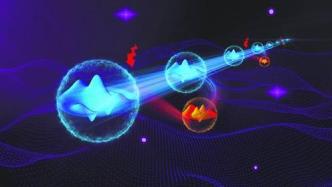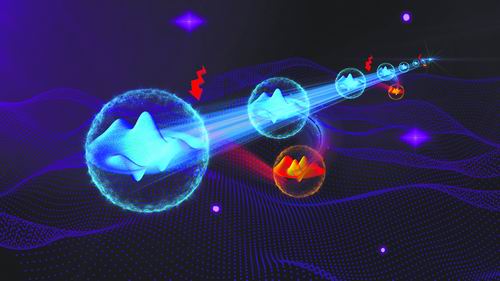

Research schematic. Photo provided by the scientific research team
Academician Yu Dapeng's team of Southern University of Science and Technology, Xu Yuan's research group, together with Zheng Shibiao of Fuzhou University, Sun Luyan of Tsinghua University and other teams, have made breakthrough experimental progress in the field of quantum error correction based on superconducting quantum circuit systems. Related research results were published in Nature on March 23.
The joint team extended the storage time of quantum information through real-time and repeated quantum error correction technology, and surpassed the break-even point for the first time in the world, demonstrating the advantages of quantum error correction. This breakthrough is a key step towards practical scalable universal quantum computing.
Since the error rate of a quantum computer system is much higher than that of a classical digital computer, quantum error correction is essential to construct a practical universal quantum computer, because quantum error correction can effectively protect quantum information from environmental noise. In the traditional quantum error correction scheme, encoding a logical qubit requires multiple redundant physical bits, which not only requires huge hardware resource overhead, but also the number of error channels will increase significantly with the increase of the number of bits, which may cause "The more you correct, the more you make mistakes." Previously, there have been many demonstrative experimental researches on this problem, but they have not really surpassed the break-even point, that is, the effect of quantum error correction is far from the best value of the system without error correction, and it is impossible to produce positive results. The quantum error correction gain of .
In order to overcome the above problems, the joint research team uses the infinite-dimensional Hilbert space in the microwave simple harmonic oscillator or Bose mode system to realize the redundant coding and quantum error correction of quantum information. In the superconducting quantum circuit system, the quantum error correction scheme based on Bose coding has the advantages of simple error types, convenient error detection, good coherence performance, more efficient hardware, and easy implementation of feedback control.
In this study, the research team finally realized the Bose mode based on discrete variables by developing quantum systems with high coherence performance, designing error symptom detection methods with low error rates, and improving and optimizing quantum error correction technology and other experimental methods. Binomial-encoded logic qubits extend the storage time of quantum information through a real-time repeating quantum error correction process. For the first time, the relevant results exceeded the best value of the system without error correction, breaking through the break-even point.
According to reports, this is the first time in the world that the storage time of quantum information has been extended beyond the break-even point by actively repeating the error detection and error correction process, which is of milestone significance.
Related paper information:
https://doi.org/10.1038/s41586-023-05784-4
(Original title "The field of quantum error correction surpasses the break-even point for the first time")